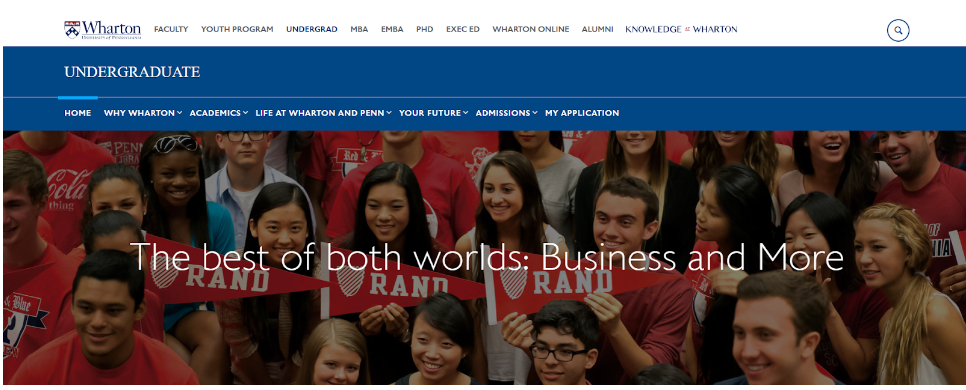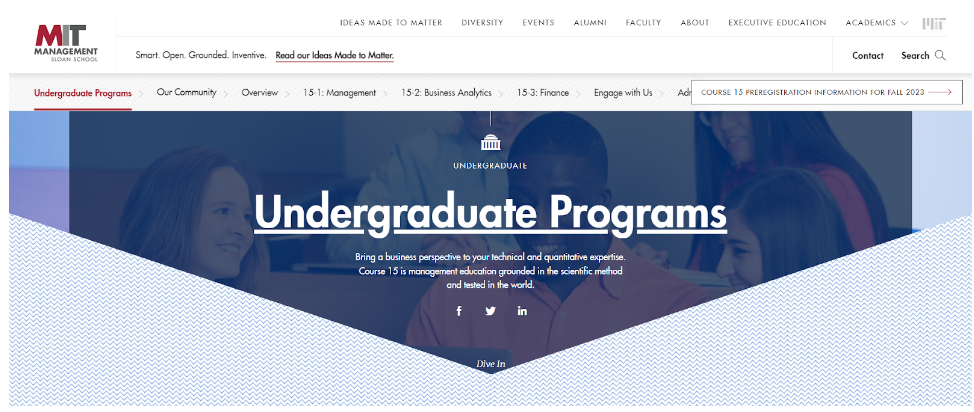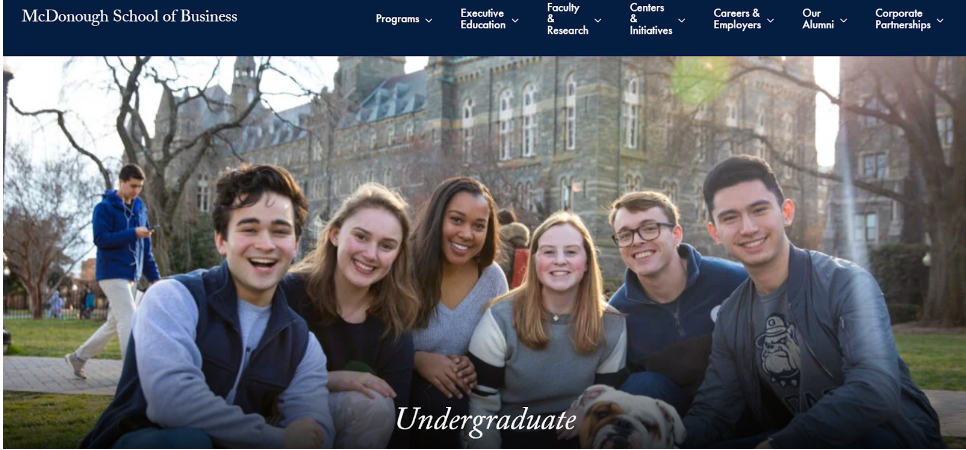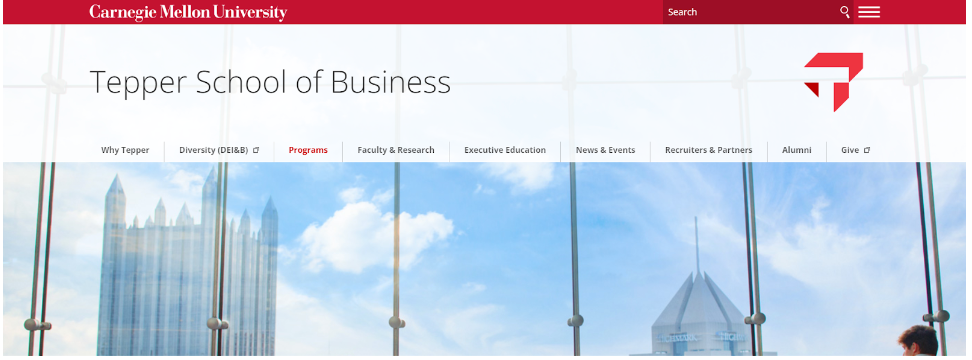An undergraduate degree in business is a popular choice among students who are interested in pursuing a career in the corporate world.
The field of business offers a wide range of career opportunities in areas such as finance, marketing, management, accounting, and entrepreneurship, among others.
In this article, I will provide some of the best undergraduate business programs in the United States based on factors such as reputation, academic rigor, job placement, and alumni success.
If you are exploring your options, this article will definitely provide you with valuable insights into the best business schools in the country.
11+ Best Undergraduate Business Programs
Here is a quick overview of the top undergraduate business programs to consider in 2024.
| Sr. No | Best Undergraduate Business Programs | Acceptance Rate | Overall Rating |
| 1. | University of Pennsylvania | 9% | 4.6/5 |
| 2. | Massachusettes Institute of Management | 7% | 4.8/5 |
| 3. | Georgetown University | 17% | 4.6/5 |
| 4. | The University of Southern California | 16% | 4.5/5 |
| 5. | Rice University | 11% | 4.4/5 |
| 6. | Cornell University | 11% | 4.3/5 |
| 7. | University of Texas-Austin | 32% | 4.5/5 |
| 8. | Northeastern University | 20% | 4.6/5 |
| 9. | Columbia University | 7% | 4.7/5 |
| 10. | University of Michigan | 28% | 4.5/5 |
| 11. | Carnegie Mellon University | 17% | 4.7/5 |
Top 11 Undergraduate Business Programs
Let’s now have a look at the best undergraduate business programs in detail.
1. University Of Pennsylvania
| QS Ranking | 14 |
| Acceptance Rate | 9% |
| SAT Range | 1460-1570 |
| ACT Range | 33-35 |
| Average Cost | $24,167 |
| Overall Rating | 4.6/5 |
The Wharton School of the University of Pennsylvania is one of the most renowned business schools in the world. It is best known for its exceptional finance program.
The admissions at Wharton School are highly competitive, with an acceptance rate of around 9%.

Moreover, according to the U.S. News and World Report, Whorton’s Master of Business Administration program is tied for first place with the University of Chicago Booth School of Business.
This school is a great choice for individuals who are willing to make their career in investment management, investment banking, private equity, or venture capital.
2. Massachusettes Institute of Management
| QS Ranking | 16 |
| Acceptance Rate | 7% |
| SAT Range | 1510-1580 |
| ACT Range | 34-36 |
| Average Cost | $19,998 |
| Overall Rating | 4.8/5 |
MIT Sloan School of Management is the world’s leading business school, aiming to develop principled and innovative leaders that advance management practice.
It offers the top undergraduate business programs like business analytics, production and operations management, information systems, and project management, along with the executive MBA programs.

On average, MIT Sloan accepts around 480 applications to their undergraduate business programs. Graduates from this school typically earn around $111,222 annually.
3. Georgetown University
| QS Ranking | 52 |
| Acceptance Rate | 17% |
| SAT Range | 1380-1550 |
| ACT Range | 31-35 |
| Average Cost | $30,710 |
| Overall Rating | 4.6/5 |
Georgetown University, i.e., McDonough School of Business Undergraduate Program, is known for its rigorous curriculum and the experiential learning opportunities they provide.
The curriculum at this school aims to provide a transformative educational experience focusing on principled leadership, analytical preparation, and global perspective.

Students at this school will be a part of a growing suite of global programs, professional engagements, entrepreneurship opportunities, and experimentally-rich academic options.
Popular majors offered by Georgetown University are Finance, International Relations, Operations Management, and Marketing.
4. The University of Southern California
| QS Ranking | 15 |
| Acceptance Rate | 16% |
| SAT Range | 1340-1530 |
| ACT Range | 30-34 |
| Average Cost | $39,759 |
| Overall Rating | 4.5/5 |
The Marshall School of Business at the University of Southern California offers specializations in various business departments like business analytics, accounting, entrepreneurship, general management, and others.
This school emphasizes real-world projects and interdisciplinary collaboration. The curriculum is designed to provide students with a strong foundation in business fundamentals.

With its strong connections to industry leaders and companies like IBM, Dell, and PwC, this university provides students with internships, various job opportunities, and access to events and workshops.
5. Rice University
| QS Ranking | 18 |
| Acceptance Rate | 11% |
| SAT Range | 1460-1570 |
| ACT Range | 34-36 |
| Average Cost | $19,215 |
| Overall Rating | 4.4/5 |
Rice University has a robust foundation for business in leadership and business fundamentals like finance, accounting, organizational behavior, and strategy and communications.
The curriculum at Rice University is designed well-rounded and in-depth to enable students to be a leader in business and various industries.

Moreover, Rice University has a top-notch faculty for undergraduate business programs, which provide practical knowledge on the basis of their experience. It is seen that graduates with bachelor’s and master’s degrees from Rice University typically earn, on average, $128,659 a year.
6. Cornell University
| QS Ranking | 20 |
| Acceptance Rate | 11% |
| SAT Range | 1400-1540 |
| ACT Range | 32-35 |
| Average Cost | $27,522 |
| Overall Rating | 4.3/5 |
Cornell University offers an exceptional undergraduate business program through the Charles H. Dyson School of Applied Economics and Management.
The undergraduate business program at Cornell is designed to provide students with a broad understanding of the business world and the analytical tools to excel in a dynamic and complex global economy.

The curriculum covers core business areas such as accounting, finance, marketing, organizational behavior, and strategy, as well as specialized courses in fields such as agribusiness, hospitality, and real estate.
The Dyson School boasts a faculty of leading scholars and practitioners in their respective fields. They are dedicated to providing students with a challenging and supportive learning environment.
7. University Of Texas- Austin
| QS Ranking | 72 |
| Acceptance Rate | 32% |
| SAT Range | 1210-1470 |
| ACT Range | 26-33 |
| Average Cost | $16,892 |
| Overall Rating | 4.5/5 |
The McCombs School of Business at the University of Texas at Austin offers a highly acclaimed undergraduate business program that prepares students for successful careers in various business fields.
With its comprehensive curriculum, world-class faculty, and strong reputation, the program is one of the most sought-after business programs in the country.

The curriculum is designed to provide students with basic foundations in majors like accounting, finance, operations, and marketing.
In addition to core courses, students can choose from a range of electives to specialize in areas such as entrepreneurship, international business, real estate, and more.
8. Northeastern University
| QS Ranking | 81 |
| Acceptance Rate | 20% |
| SAT Range | 1410-1540 |
| ACT Range | 33-35 |
| Average Cost | $37,738 |
| Overall Rating | 4.6/5 |
The undergraduate program at Northeastern University enables students to develop and build the skills needed to lead in today’s technologically driven business world.

Academics combines knowledge in technology and management with critical thinking, creativity, and an entrepreneurial mindset. With a wide variety of real-world experiences and projects, students are trained to build their own personal brands.
A graduate from Northeastern University typically earns around $67,400 annually 6 years after graduation.
9. Columbia University
| QS Ranking | 82 |
| Acceptance Rate | 7% |
| SAT Range | 1460-1570 |
| ACT Range | 33–35 |
| Average Cost | $22,126 |
| Overall Rating | 4.7/5 |
Columbia Business School is one of the six Ivy League business schools and one of the world’s oldest business schools.
It is a 4-year program covering eight semesters and is designed to provide students with an in-depth business education while also allowing them to specialize in a specific area of interest.

The program’s core courses cover fundamental business topics such as accounting, finance, marketing, operations, and organizational behavior.
It also includes a variety of professional development opportunities, including internships, case competitions, and career services.
Some of the top employers of CBS graduates include Goldman Sachs, McKinsey & Company, Google, and J.P. Morgan.
10. The Ross School Of Business (University Of Michigan)
| QS Ranking | 29 |
| Acceptance Rate | 26% |
| SAT Range | 1340-1520 |
| ACT Range | 31–34 |
| Average Cost | $17,832 |
| Overall Rating | 4.5/5 |
This business school is highly respected and prepares students for business and leadership positions in the business world.
This program is designed to provide students with hands-on learning experiences that help them to apply the knowledge to real-world business scenarios.

It offers a collaborative learning environment where students develop their teamwork, leadership, and communication skills.
This school also provides access to various business communities and a wide range of internship offers.
11. The Tepper School Of Business (Carnegie Mellon University)
| QS Ranking | 7 |
| Acceptance Rate | 17% |
| SAT Range | 1460-1560 |
| ACT Range | 33–35 |
| Average Cost | $36,983 |
| Overall Rating | 4.7/5 |
The Tepper School of Business is rewarded for its analytical and quantitative approach to business and management education.
The academics include exceptional training in core majors like economics, statistics, operations, and other qualitative disciplines. These programs prepare students to deal with business challenges in a data-driven manner.

Moreover, it offers core minors like business intelligence, machine learning, and business analytics.
This school has partnerships with leading tech companies like Microsoft, Google, and Amazon that provide students with various career opportunities.
Related Read:
Conclusion: Best Undergraduate Business Programs (2024)
The programs highlighted in this article are some of the best undergraduate business programs in the United States.
They offer a variety of opportunities for students to learn and grow, from hands-on experience to rigorous coursework to networking with business professionals.
Ultimately, the best undergraduate business program for a student will depend on their individual goals, interests, and strengths.
By evaluating their options and finding a program that aligns with their aspirations, you can set yourself up for a rewarding career in the exciting and ever-changing business world.
So, what are your thoughts on this? Let us know in the comment section below.
